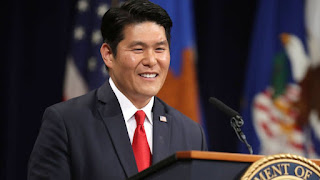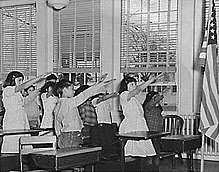When Mad Dog scrolls through youtube from his basement treadmill, he often stops on anything with Jon Stewart, who Mad Dog has learned is a source of great satisfaction and sanity.
But today, he stumbled upon a disturbing interview Stewart attempted with a lady who is capable of rigorous thinking and drawing important distinctions, and Stewart, realizing he was been demolished in his own element, resorted to reaching for applause lines and pitching his remarks to safe shibboleths of popular indignation, like the mistreatment of the average soldier and veteran. Stewart was trying to do was to establish himself as a crusading journalist, intent on exposing corruption in a self satisfied bureaucracy, which wields enormous power and a staggering budget.
He was doing this in an interview with an under secretary of Defense, Kathleen Holland Hicks, apparently on the heels of a story about the Department of Defense being unable to pass an audit about the spending of a billion dollars.
This audit, Stewart insisted must reveal "waste, fraud and abuse."
The problem was, he did not really understand what an audit is or how it's used in the same deep way Hicks does, and she was able to unmask his superficial misapprehension by simply turning the tables and asking him the questions, each of which sequentially unhinged him, and left him more and more untethered.
So Stewart resorts to poster slogan: "I'm may not understand the ins and outs, but I live on Earth, and I can't understand how an organization can get $850 billion dollars, and its people, its soldiers, still have to be on food stamps. To me, that's corruption. I'm sorry."
So, what he was really saying, is the same sort of things Trumpies say: I may not have command of the details or the facts, but I know what I believe!
He gets the applause he was looking for to rescue him, but it did not rescue him.
Hicks kept trying to unpack Stewart's complaints, which he was directing at her department, the Department of Defense:
They came down to these:
1/ Soldiers' families on food stamps:
For all the increased spending on defense, so little of it filters down to the working stiffs, the soldiers, sailors and airmen, their families are on food stamps
On my treadmill, puffing along, I could plainly see that soldiers on food stamps has nothing to do with failure of an audit, or that our soldiers are impoverished. In fact, Hicks responds with figures supporting the idea military pay has gone up twice in the past few years, no matter what you say about food stamps.
I remember when rich medical students in my own medical school class somehow managed to get food stamps for their meals. Being on food stamps does not mean the military is corrupt.
Hicks replied, okay, if we are done with waste, fraud and abuse, which plays no part in food insecurity for soldiers, let's talk about what "food insecurity" really means in the military: it has to do with whether there is a good meal awaiting the servicemen when they get off the boat and back to their home base.
https://www.youtube.com/watch?v=50MusF365U0
2/ After the war in Afghanistan ended Stewart expected the budget for the Defense Department, the defense budget would decrease, but instead it increased by some billions of dollars:
But, of course, increase in the Defense Department budget does not mean officials in the Defense Department are committing fraud or abuse.
Defense spending increases for reasons not entirely in the control of the Defense Department. Congressmen, wanting to keep dollars flowing to their districts, keep appropriating funds for things Defense does not even want. Jim Jordan keeps sending money to build tanks in his district. Tanks! The Ukrainians may need tanks, but does the US military really need more tanks? That is likely real waste, but not the fault of Ms. Hicks and her Department.
3/ The spending by the Department of Defense went to a trillion dollar program for new aircraft and these aircraft do not even work.
Hicks, of course cannot defend a trillion dollar plane (she may not have even wanted) which cannot fly, but this is not an example of fraud, although it may be wasteful and an abuse by some Congressmen who want that airplane built in their districts. But it's not the fault of the Defense Department, which is all she can talk about. She is undersecretary of Defense, not the chairman of the House Committee on defense appropriations.
"Audits cannot reveal waste, fraud and abuse," Hicks says. "It tells you if what was paid for gets delivered."
"Oh," Stewart says, "That's all just institutional speak."
In their entry on Hicks, Wikipedia says Hicks came off looking "defensive" which is the classic remark when someone responds effectively to a half baked argument by blowing it out of the water. Of course, she is being defensive. Yes, she is defensive like those missiles which blow incoming rockets out of the air. And she is doing her job, which is to defend the Defense Department.
It is a sad thing to watch Stewart disintegrate, as the great muckraker looks, rather plainly, like someone intent on posing as the high priest of investigative journalism, as he starts meandering into accusations that trillion dollar airplanes don't work and that the defense budget actually got increased after the end of the war in Afghanistan, as if there is only one reason why the defense budget could increase ("waste/fraud/abuse) rather than the politics of Congressmen who want dollars flowing to their districts, or increased costs of high tech missiles, or a myriad of other possible reasons--while his foil undoes him by asking him questions, which unmask his own ignorance of the system she knows so much better than he does.


























